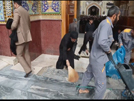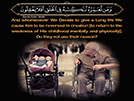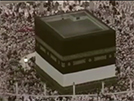Imam Reza (AS) During the Reign of Harun al-Rashid
- Details
- Hits: 6860
.jpg)
Imam Reza (AS) During the Reign of Harun al-Rashid
Attempts to Eliminate the Imam
Ja'fer ibn Yahya says: "I heard Isa ibn Ja'fer say to Haroun (al-Rashid) upon leaving al-Riqqa for Mecca, `Remember your oath by the dignity of the descendants of Abu Talib that should anyone after Mousa (al-Kazim, A.S.) claim Imamate, you would strike his head with the sword. This Ali, his son, claims so, and people are addressing him in the same way they used to address his father.' He looked at him angrily and said, `Why? Do you expect me to eliminate each and every one of them?'" Mousa ibn Mahran says that when he heard Ja'fer ibn Yahya say so, he went to him (i.e. to Imam al-Reza) and told him what he had heard. Al-Reza (AS) responded by saying, "What do I have to do with them? By God, they cannot hurt me in the least."
Such incitements were not confined within a reasonable limit but went beyond it to dangerous ones where instigation might cause al-Rashid to pay serious attention, for the Barmakis were most antagonistic towards the Descendants of the Prophet (p.b.u.h) and the most cruel among them in their grudge, so much so that it is reported that Yahya ibn Khalid al-Barmaki was the one who ordered the murder of Imam Mousa ibn Ja'fer (AS)69 when the Abbaside caliphate was under their mercy.70 Imam al-Reza (AS) rendered God's retribution against the Barmakis to their persecution and oppression the worst of which was suffered by Imam al-Kazim (AS).71 Suffices for proof is the fact that Yahya ibn Khalid was the one who plotted the ugly plot against Imam al-Kazim (AS) after causing Haroun al-Rashid to be angry with him, instigating al-Rashid against the Imam (AS) and using some naive weaklings among the Alawides to achieve his goal.72
It was, indeed, an attempt which spelled the extent of grudge felt by Yahya ibn Khalid whose purpose was to pressure al-Rashid into murdering Imam al-Reza (AS) and make him join his father. He said to him one day: "This Ali, his son, has seated himself in place and claimed the matter (Imamate) for himself." He (al-Rashid) said: "Is it not enough for us what we have done to his father? Do you wish that we should kill them all?"73 Al-Rashid's answer points out to the extent of anguish he was suffering deep inside, and it reveals the bitter struggle exploding deep inside him.
Suffices him to live carrying the guilt of murdering the pure soul of the Imam's father whom he subjected to numerous types of trials and tribulations till he joined his Lord well-pleased and satisfied after having faithfully executed the responsibilities of Imamate which were entrusted to him honestly and faithfully, while the tyrant's soul was no longer able to bear any bigger sin anymore.
Al-Rashid Moves to Eliminate the Imam
Finally, al-Rashid is surrounded by a large number of courtiers instigating him to kill Imam al-Reza (AS), and they finally succeeded in stirring his feeling of anger against the Imam (AS), stimulating his beastly instinct to eagerly kill. Abul-Salt al-Harawi narrates saying that one day he was sitting with the Imam (AS) at his house when a messenger from Haroun al-Rashid came in and ordered the Imam (AS) to present himself before the caliph.
The Imam (AS) said: "O Abul-Salt! He does not call upon me at such a time of the night except for trouble. By God! He cannot do anything which I hate to me because of what I had come to know of certain statements said by my grandfather the Messenger of God (p.b.u.h)." Abul-Salt continues his narrative to say that he accompanied the Imam (AS) when he entered the court of Haroun al-Rashid.
When the latter looked at him, al-Reza (AS) read those words of the Prophet (p.b.u.h), and when he stood before al-Rashid, the latter looked carefully at him and then said, "O Abul-Hassan! We have ordered a hundred thousand dirhams for you, and write down the needs of all your family." When the Imam (AS) left the court, the caliph kept looking at him as he was leaving and said behind his back: "I wished, and God wished otherwise, and what God wished was good."
Thus did God save the life of the Imam (AS) who sought refuge with Him, seeking His assistance through the sincere words he had come to know that his grandfather the Messenger of God (p.b.u.h) had articulated. Al-Rashid, on the other hand, went back to himself satisfied after destiny had opposed his vicious intention just to realize that what God had done was indeed better than what he himself had intended to do.
Sincere Attempts
Contrariwise, there were sincere attempts to distance Imam al-Reza (AS) from danger which were undertaken by some of his followers who had tasted the bitterness of pain during the adversity suffered by his father Imam al-Kazim (AS) who suffered a great deal of oppression and persecution at the hands of the stubborn tyrant Haroun al-Rashid. Those attempts required the Imam (AS) to cease publicly promoting his mission and to distance himself from the situations which would clearly attract the attention of the government to him and become a cause for its revenge and desire to eliminate him.
But the Imam (AS) who was confident of his stance did not pay attention to those attempts, and he was of the view that they were simply unnecessary due to some knowledge he had learned from his forefathers which assured him that al-Rashid would not be able to harm him in any way.
For example, Safwan ibn Yahya is quoted saying: "When Abul-Hassan Mousa (AS) passed away and al-Reza (AS) started preaching his mission, we were worried about his life and we said to him, `You have declared something of great magnanimity, and we worry about your safety because of this tyrant.' He said, `Let him try his best, for he shall not have the means to hurt me.'"74
Muhammad ibn Sinan said: "During the reign of Haroun, I said to Abul-Hassan al-Reza (AS), `You have made yourself well-known because of this matter and followed in the footsteps of your father while Haroun's sword is dripping with blood.' He said, `What made me bold in this regard is that the Messenger of God (p.b.u.h) had said: `If Abu Jahl harms even one hair on my head, then bear witness that I am not a Prophet,' and I tell you that if Haroun took one hair away from my head, then bear witness that I am not an Imam.'"75
Vicious Intentions
Some Waqfis tried to warn him against declaring himself as the Imam (AS) and openly acting as such, and he answered them saying that such a matter did not require a warning, and that the fear that Haroun might hurt him was groundless. Those individuals had only one objective in mind: to discourage the al-Reza (AS) from making himself known as the Imam and making his Imamate public so that they might be able to promote their "sect" which claimed that the Qa'im was Imam Mousa ibn Ja'fer (AS) and that he was still alive as we mentioned above. Let us review the dialogue between the Imam (AS) and some of those Waqfis. Abu Masrooq has stated:
"A group of Waqfis entered the house of the Imam (AS) once and among them were men like Abu Hamza al-Bataini, Muhammad ibn Ishaq ibn Ammar, al-Husayn ibn Umran, and al-Husayn ibn Abu Sa'id al-Makari. Ali ibn Abu Hamza said to him, `May my life be sacrificed for you! Tell us how your father is doing.' He said, `He, peace be upon him, passed away.' He said, `Who did he recommend to succeed him?' He answered, `Myself.'
He said, `You are claiming something which none among your forefathers claimed, starting from Ali ibn Abu Talib downwards.' He said, `It was said by the best of my forefathers and the most distinguished among them: the Messenger of God (p.b.u.h).' He asked, `Do not you fear them for your safety?' He said, `Had I worried about my safety, I would have been in a position to do something to protect myself. The Messenger of God (p.b.u.h) was approached once by Abu Lahab who threatened him; the Messenger of God (p.b.u.h) said to him: `If I am scratched by you even slightly, then I am indeed a liar.'
That was the first time the Messenger of God (p.b.u.h) incited someone, and this is the first time I do likewise and tell you that if I am scratched by Haroun even slightly, then I am indeed a liar.' Al-Husayn ibn Mahran said to him, `If this comes to pass, then we will have achieved our objective.'
He said, `What do you exactly want? Should I go to Haroun and tell him that I am the Imam (AS) and that he is nobody? This is not how the Messenger of God behaved at the outset of his mission; rather, he said so to his family and followers and those whom he trusted from among the public. You believe that Imamate belongs to my father, claiming that what stops me from admitting that my father is alive is my own fear. I do not fear you when I say to you that I am the Imam; so, how can I fear you if my father is indeed alive?'"76
The Imam's expectation proved to be true; al-Rashid breathed his last without hurting the Imam (AS) a bit.
From the Series of Tragedies
One incident which took place during the reign of al-Rashid reminds us of the chain of tragic events from which the Alawides suffered during the reign of al-Mansour. In Medina, Muhammad ibn Ja'fer declared rebellion against the government; therefore, al-Rashid sent an army under the command of al-Jalloodi to crush his rebellion, ordering al-Jalloodi to behead the man if he could lay his hand on him.
Al-Rashid, furthermore, was not satisfied with just that. He instructed his commander to assault the houses of the descendants of Abu Talib and loot everything their women had without leaving even one piece of clothing on them.
Al-Jalloodi tried to execute al-Rashid's order in person; therefore, he attacked the house of Imam al-Reza (AS) using his cavaliers. Having seen him, the Imam (AS) put all the women in one house, and he stood at its door. Al-Jalloodi said to Abul-Hassan: "I have got to enter the house and strip the women of everything just as the commander of the faithful ordered me." Al-Reza (AS) said: "I can do that for you, and I will not leave anything for them." The Imam (AS) kept requesting him to accept, swearing that he would do just that till the man calmed down and consented. Abul-Hasan took their wares, including their ear-rings, anklets, shirts, and every valuable item in the house, small or big.
This incident, if true, does not depict an unusual behaviour by al-Rashid towards the Alawides since he was full of grudge and animosity towards them. What encourages us to believe in it is what Ibn al-Athir narrates about al-Rashid at the time of his death, shortly before meeting his Maker.
He was moaning and groaning while saying, "How horrible my evil deeds are towards the Messenger of God! How Horrible!"77 This is a clear expression of the admission of the calamities he inflicted upon the family of the Prophet (S.W.A.), of his horrible sins, of a bitter regret which was consuming his soul at the time of its departure.
Notes:
69 'Uyoon Akhbar al-Reza, Vol. 2, p. 226.
70 'Umdat al-Talib, p. 185, 1st edition (Najaf, Iraq).
71 Bihar al-Anwar, Vol. 48, p. 249, quoting Al Kafi.
72 Shaikh al-Toosi's Al Ghayba, p. 22.
73 'Uyoon Akhbar al-Reza, Vol. 2, p. 226.
74 Al Kafi, Vol. 1, p. 487. It is also mentioned in Al 'Uyoon, Al Manaqib and Al Irshad.
75 Rawdat al-Kafi, p. 257.
76 A'yan al-Shi'a, Vol. 4, Part I, p. 138.
77 Ibn al-Athir, Vol. 5, p. 130.











